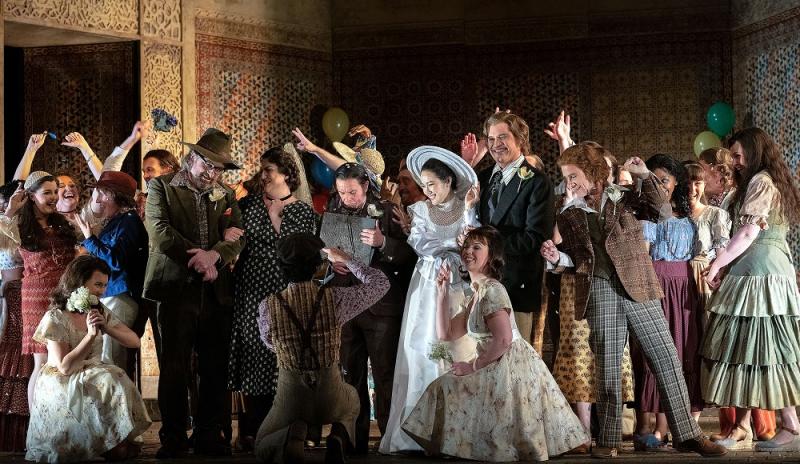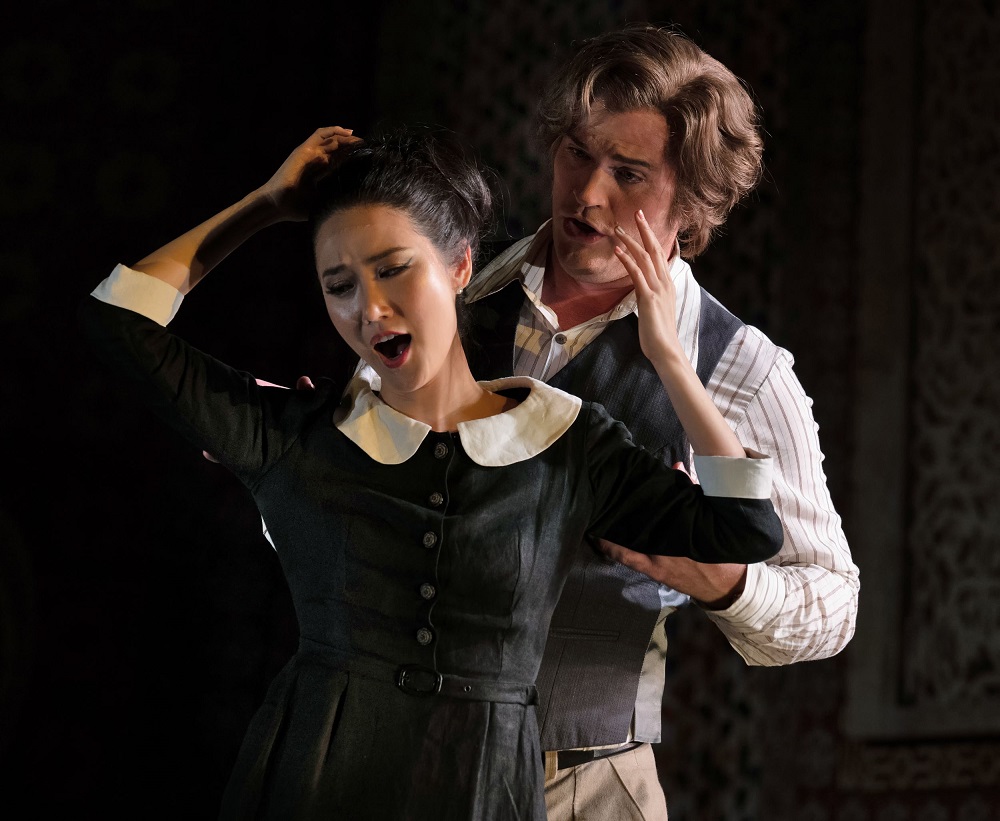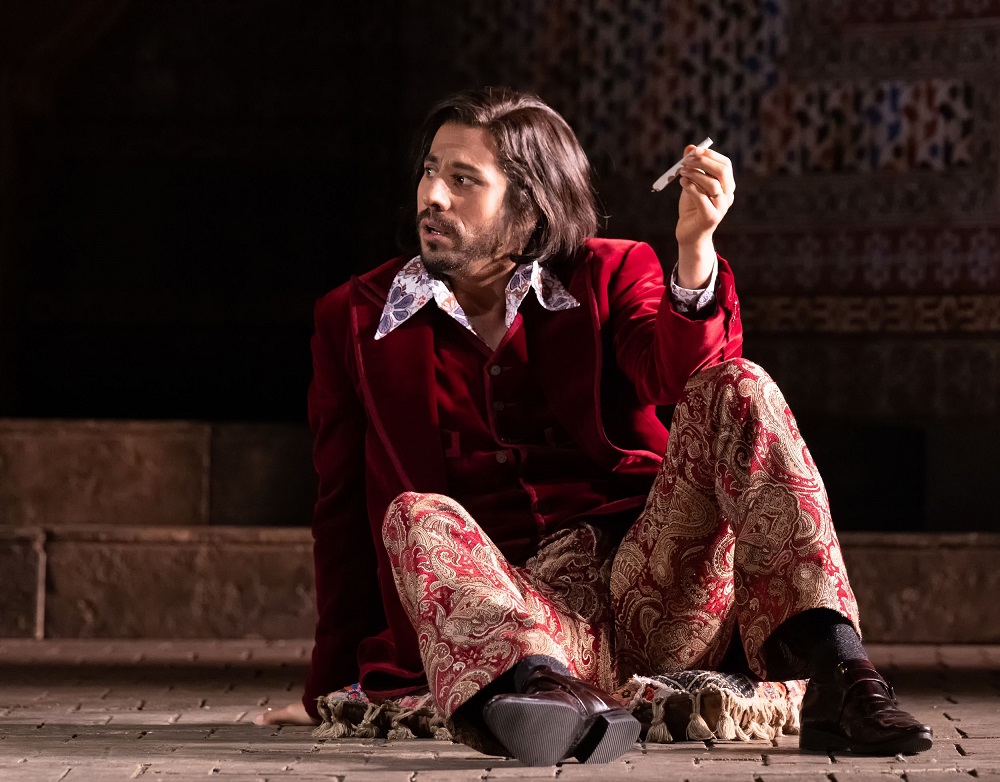Le nozze di Figaro, Glyndebourne review - fabulous singing and a classy production | reviews, news & interviews
Le nozze di Figaro, Glyndebourne review - fabulous singing and a classy production
Le nozze di Figaro, Glyndebourne review - fabulous singing and a classy production
Superb music making against the backdrop of a sumptuous Sevillian set

After two years of Covid-affected performances – even though there was a full season last year – Glyndebourne's annual festival is finally back in full glory. Following the big blaze of Saturday's The Wreckers, Sunday welcomed back Michael Grandage's durable production of a signature treasure, Mozart’s The Marriage of Figaro.
With a remarkable cast, phenomenal sounds from the pit and a sumptuous set, this was a very classy performance indeed. Set in 1960s Seville, the set – clearly inspired by the city’s Moorish architecture – was awash with muted colours and golden hues, and was a beautiful backdrop to the characters’ antics. The London Philharmonic Orchestra, under the baton of Giancarlo Andretta, opened with a light and ebullient sound, at once conveying the opera’s witty humour, so much so that the slight technical hitch with the revolving stage during the Overture seemed all part of the fun.  American bass-baritone Brandon Cedel is a brilliantly funny Figaro, though his portrayal of darker emotions was perhaps less convincing, with some slightly hammed-up anger and insincere sorrow. Vocally, though, he was excellent throughout, as was his bride Susanna, sung with crystal clarity by Hera Hyesang Park (pictured above, with Cedel). Emily Porgolec’s Cherubino certainly embodied the attributes of an excitable and somewhat randy teenage boy, though some of the jokes of the acting didn‘t quite land with me; maybe being a bit of a pest was considered cuter in the 1960s than it is today.
American bass-baritone Brandon Cedel is a brilliantly funny Figaro, though his portrayal of darker emotions was perhaps less convincing, with some slightly hammed-up anger and insincere sorrow. Vocally, though, he was excellent throughout, as was his bride Susanna, sung with crystal clarity by Hera Hyesang Park (pictured above, with Cedel). Emily Porgolec’s Cherubino certainly embodied the attributes of an excitable and somewhat randy teenage boy, though some of the jokes of the acting didn‘t quite land with me; maybe being a bit of a pest was considered cuter in the 1960s than it is today.
Count Almaviva’s advances towards Susanna, however, are never particularly okay, though the humour of the piece is still very much to the fore as the other characters collaborate to outwit him. Mexican baritone Germàn Olvera gives a wonderfully sleazy portrayal, and his outfit of Paisley patterned flares with a red velvet waistcoat and jacket was one of the best on stage. His long suffering wife the Countess was sensitively sung here by soprano Amanda Woodbury, who performed the aria "Porgi, amor" with a heartfelt tenderness as she laments her husband’s jealousy and infidelity.
 As beautiful as the production is to look at, it didn’t exactly scream Sixties. The word "groovy" appears in the supertitles, which, last time I checked, isn’t in most translations of Da Ponte’s libretto. The bridesmaids’ outfits had a touch of the Mary Quant look about them, but the wedding dancing, which was made a lot of, looked like a mix of moves from Saturday Night Fever and the Macarena, neither of which are from that decade. It did, though, show how Pierre Beaumarchais’s 1778 play on which the opera is based reveals universal human truths which continue to be relevant, and humour which will always endure.
As beautiful as the production is to look at, it didn’t exactly scream Sixties. The word "groovy" appears in the supertitles, which, last time I checked, isn’t in most translations of Da Ponte’s libretto. The bridesmaids’ outfits had a touch of the Mary Quant look about them, but the wedding dancing, which was made a lot of, looked like a mix of moves from Saturday Night Fever and the Macarena, neither of which are from that decade. It did, though, show how Pierre Beaumarchais’s 1778 play on which the opera is based reveals universal human truths which continue to be relevant, and humour which will always endure.
Add comment
The future of Arts Journalism
You can stop theartsdesk.com closing!
We urgently need financing to survive. Our fundraising drive has thus far raised £49,000 but we need to reach £100,000 or we will be forced to close. Please contribute here: https://gofund.me/c3f6033d
And if you can forward this information to anyone who might assist, we’d be grateful.

Subscribe to theartsdesk.com
Thank you for continuing to read our work on theartsdesk.com. For unlimited access to every article in its entirety, including our archive of more than 15,000 pieces, we're asking for £5 per month or £40 per year. We feel it's a very good deal, and hope you do too.
To take a subscription now simply click here.
And if you're looking for that extra gift for a friend or family member, why not treat them to a theartsdesk.com gift subscription?
more Opera
 La bohème, Opera North review - still young at 32
Love and separation, ecstasy and heartbreak, in masterfully updated Puccini
La bohème, Opera North review - still young at 32
Love and separation, ecstasy and heartbreak, in masterfully updated Puccini
 Albert Herring, English National Opera review - a great comedy with depths fully realised
Britten’s delight was never made for the Coliseum, but it works on its first outing there
Albert Herring, English National Opera review - a great comedy with depths fully realised
Britten’s delight was never made for the Coliseum, but it works on its first outing there
 Carmen, English National Opera review - not quite dangerous
Hopes for Niamh O’Sullivan only partly fulfilled, though much good singing throughout
Carmen, English National Opera review - not quite dangerous
Hopes for Niamh O’Sullivan only partly fulfilled, though much good singing throughout
 Giustino, Linbury Theatre review - a stylish account of a slight opera
Gods, mortals and monsters do battle in Handel's charming drama
Giustino, Linbury Theatre review - a stylish account of a slight opera
Gods, mortals and monsters do battle in Handel's charming drama
 Susanna, Opera North review - hybrid staging of a Handel oratorio
Dance and signing complement outstanding singing in a story of virtue rewarded
Susanna, Opera North review - hybrid staging of a Handel oratorio
Dance and signing complement outstanding singing in a story of virtue rewarded
 Ariodante, Opéra Garnier, Paris review - a blast of Baroque beauty
A near-perfect night at the opera
Ariodante, Opéra Garnier, Paris review - a blast of Baroque beauty
A near-perfect night at the opera
 Cinderella/La Cenerentola, English National Opera review - the truth behind the tinsel
Appealing performances cut through hyperactive stagecraft
Cinderella/La Cenerentola, English National Opera review - the truth behind the tinsel
Appealing performances cut through hyperactive stagecraft
 Tosca, Royal Opera review - Ailyn Pérez steps in as the most vivid of divas
Jakub Hrůša’s multicoloured Puccini last night found a soprano to match
Tosca, Royal Opera review - Ailyn Pérez steps in as the most vivid of divas
Jakub Hrůša’s multicoloured Puccini last night found a soprano to match
 Tosca, Welsh National Opera review - a great company reduced to brilliance
The old warhorse made special by the basics
Tosca, Welsh National Opera review - a great company reduced to brilliance
The old warhorse made special by the basics
 BBC Proms: The Marriage of Figaro, Glyndebourne Festival review - merriment and menace
Strong Proms transfer for a robust and affecting show
BBC Proms: The Marriage of Figaro, Glyndebourne Festival review - merriment and menace
Strong Proms transfer for a robust and affecting show
 BBC Proms: Suor Angelica, LSO, Pappano review - earthly passion, heavenly grief
A Sister to remember blesses Puccini's convent tragedy
BBC Proms: Suor Angelica, LSO, Pappano review - earthly passion, heavenly grief
A Sister to remember blesses Puccini's convent tragedy
 Orpheus and Eurydice, Opera Queensland/SCO, Edinburgh International Festival 2025 review - dazzling, but distracting
Eye-popping acrobatics don’t always assist in Gluck’s quest for operatic truth
Orpheus and Eurydice, Opera Queensland/SCO, Edinburgh International Festival 2025 review - dazzling, but distracting
Eye-popping acrobatics don’t always assist in Gluck’s quest for operatic truth

Comments
A slight correction. Last
I attended the performance on
Fine singing and playing